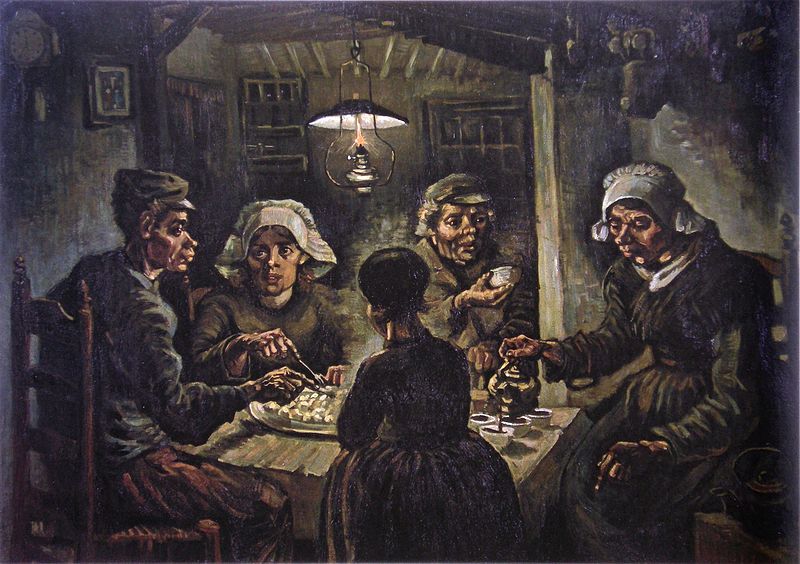Garbage in Garbage Out: Economical Politics in the Current Educational System (A Mini Philosophical Rant)
Everything that could be commodified, has to some degree been commodified. Things that have not been commodified, or by-products from the commodification of everything, will soon also fall into this dark loop. Capitalism, in the state it is now, only supports that what brings in money, and in some sense rejects that what cannot bring in money. I wrote a while ago on the present state of bread baking in South Africa, or in the area where I live. The process of sourdough bread takes time. But there is a demand for sourdough bread. There are various “players” in the field of sourdough bread baking taking shortcuts and producing “sourdough” bread (which is not sourdough in the sense everyone uses the term) faster and more efficiently. They are capitalizing on inferior products in a market that does not understand bread. Taking time and producing slow bread (which is actually just normal bread) loses you money by the hour as the competitor sells their bread. The incentive becomes clear: the longer you wait the less money you will make, hence the “un-desire” for slower products from a financial point of view. I will claim that the same thing is happening in the education system (and that it has been going on for years; we are only now feeling the repercussions).
Take it with a grain of salt: A philosophical rant

Education has been seen as a right (in my country of South Africa). So, everyone has the opportunity (not always equal) to an education via the national educational system. We have private schools, but the majority of people, myself included, gets their education through the national system. The problem with seeing it as a right is that the quality of education gets watered down, even if only a little at a time. (We have this thing where a “national pass rate” for the country is calculated. Every year the number gets inflated and people who, strictly spoken, did not pass, get through.) When some of these learners end up at university, their “inferior” and watered-down education lets them down and they fail. But because university education is so expensive, people can get extra opportunities to write more papers (even though they technically failed) in order to pass.
The incentive then: Do not worry about passing, there will be more opportunities.
The second incentive: If you pay your fees, you have a “right” to pass.
There will obviously be people who fail in such a manner that you cannot let them pass. But there are so many people on the edge that gets through because of two reasons. (1) Like I said, people have this idea that if you pay your university fees, it is as good as a pass, and (2) the lecturers and departments do not want the students again the next year. What is education fundamentally? It is, according to me, the action of gaining knowledge (practical, theoretical, etc.) which you can apply in any manner fit. I am a philosopher, and I give philosophy classes. So, my experience is in the humanities. For me, the idea of a philosophical education is to see if you can grasp the arguments, and that you can use said knowledge in a practical manner, especially in something like logic. The writing of a philosophy essay is also an example of a practical application of the knowledge you acquired.
If you are not able to do these things, if you are, for example, not able to produce a text that passes the standard, there is no way that you should pass. The simple reason is that you did not meet the requirements, please try again. There might be a backlog, i.e. students of previous years filling space of students from the current year, but the system should work like this. If you do not make the cut, then try again.

Here is where I identify the problem and why I am linking it to the economical problem I talked about above regarding the breads. If you keep students back because they did not “make the cut”, you will in effect need double the money. That is, if the system is structured in such a way as to cost money at every step. (I will briefly touch on this again.) In South Africa, the government sponsors a certain amount of money per student per year. If you go over the allotted time, you’re in a sense a burden. You cost more. Therefore, it is easier to pass them on to get them out of your class or module. Pass on the burden. (This is obviously very much oversimplified, and as it is a rant, this might not be the most accurate representation of how it works.)
Now the problem. If these people get through the system, those who are “objectively” not educated as they should have been, how does it impact everyone around them? Two things. (1) It waters down everyone’s degrees. It in some sense states that what you did was good, but others who did so much less were also good. (This again is very much oversimplified.) (2) These people get into the system as teachers and educators of others. And this where the real problem is showing in South Africa today. (This is all conjecture and speculation, again, it is a ranting as well.) Critical thinking is lacking in South African education because people are getting through the educational system due to there being a lack of standards. Critical thinking is not encouraged because it is harder to assess. Educators in schools “educate” students to “parrot” and regurgitate work because it marks easier, and it is easier to assess. (This is based on several experiences and my own education through the system.) Critical thinking is never encouraged, it is rarely engaged with, and it is never fostered.
The consequences
The consequence of the problems above is that students and learners are incapable of reasoning. No one has ever thought them reasoning skills or the basics of logic (regarding argument structuring etc.). In philosophy, writing a logically coherent argument is of utmost importance. The content is not always that important, it is the way you reason for it. You can be wrong, in the sense that you are factually incorrect. But no one can criticize your reasoning if it is valid. Again, it might be wrong, but the logic might be sound/valid. These skills are lacking, even from philosophy students. This is truly scary because the whole idea of education is to give you these tools. But in our capitalist system, time equals money, and investing in people’s education does not pay. In the short run, it is cheaper to let students pass who sort of show that they understand. If you can regurgitate enough class notes, if you can parrot the lectures, then you “show” competence. But any educator who is truly an educator knows that parroting the work does not show understanding. Education, then, in essence, is about giving the learner/student the tools so that they can show understanding. But this is lacking, and I am worried about my own subject’s future if students who cannot show a bare minimum understanding of logic, get through the ranks so easily.










Comments